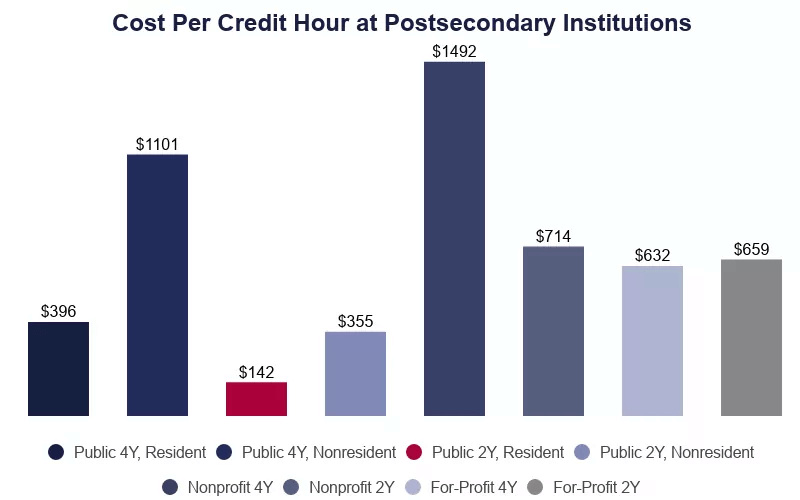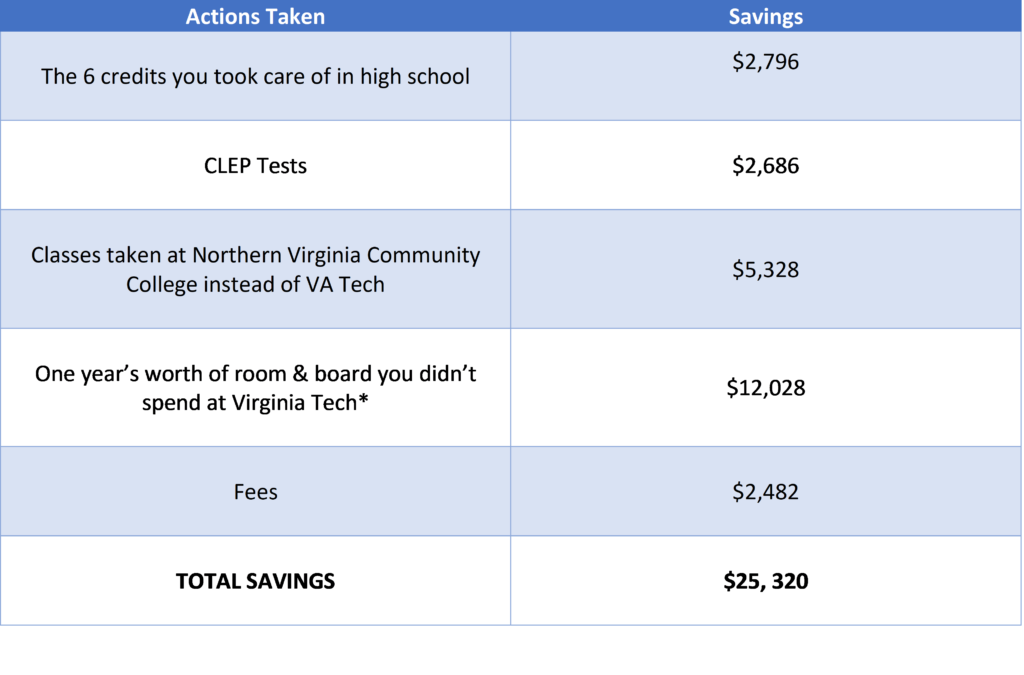A Possible Strategy to Help Minimize the Cost of College
With current graduation rates pushing beyond four or even five years, you may be surprised that graduating in three years is achievable without wearing yourself out. Students can often be intimidated by this prospect, but there are a plethora of resources available today that can help expedite the graduation process.
With proper planning and motivation, a three-year graduation is more accessible than you think.
Getting Started: The Importance of Personal Responsibility and Self-Advocacy
Though some programs will require more, let us start with the assumption that a student will need 120 credits to graduate with a standard bachelor’s degree.
How we get to this number and how much we spend to get to this number is more in our control than a lot of us realize. As one of our student liaisons, a sophomore who attends Virginia Tech, remarks, “as a freshman, I thought our advisors decided everything for us. I’ve come to learn that how you get to 120 credits is completely in your own hands.” We will cover this more in the section on course efficiency at the end of the post.
The first 60 credits are largely made up of general education classes and electives. It is crucial that you achieve these credits as inexpensively as possible, and a good amount of them should be achieved before that laundry basket full of random dorm room stuff comes out of the trunk at college.
What steps do you take to accomplish this?
Dual Enrollment
Let’s start in high school. A lot of high schools now offer what are called “Dual Enrollment” courses. These are college-level courses that a student can take in high school for college credit. The high school usually partners with a local university or community college that blesses the classes. These should be highly considered because they are often a fraction of the cost compared to the same class at college a year later. The cost of these classes at Loudoun County Schools in Virginia is $10 per credit hour. Contrast this with the cost per credit hour at Virginia Tech: $476!

Source: educationdata.org
These classes may also “matriculate” you into the local community college, which can be very advantageous if it allows you to take additional classes at the community college the summer between your senior year of high school and your freshmen year of college. More on that in a minute.
A word of caution: if your child may end up at an out-of-state college, the credit transfer process with DE classes can get messy. So, make sure you do your research! AP classes may end up being more beneficial in this case.
CLEP Tests
Most parents we talk to about college funding are very focused on how many AP classes their kids should take. They know that getting good grades in AP classes is great for admission purposes and that high scores on the AP tests can count for college credit and eliminate the need for gen eds.
But the majority of families we talk to have never heard of CLEP tests. This is likely because they are advertised more for non-traditional students. Regardless, they can save you thousands of dollars and a whole lot of hours of your life.
The College Level Examination Program offered through The College Board allows students to “test out” and receive college credits. Unlike the AP Exams, CLEP tests are offered year-round and ask about material the student may already know.
Families will, however, need to do some investigative work. Not all schools accept these credits, and the schools that do may only accept certain subjects. The good news is that over 2,900 schools DO accept CLEP credits.
You might want to figure out which schools you are interested in ahead of time, then search their website for which CLEP tests they accept. You can do a preliminary search on the college board website here. You will likely see a lot of common ones between schools, like U.S. History or American Literature.
Summer Productivity: Classes & Certifications
In years past, students trying to get a leg-up during the summer might have trekked to the local community college early in the morning. Now it’s as easy as getting out of bed and opening up your laptop. The abundance of online classes–and not even necessarily connected to the local community college–is a game-changer.
Once again, It is crucial to make sure these credits will transfer to the four-year university/colleges you might attend. Some colleges may have stipulations on summer classes, so finding out beforehand should be part of the college “hunt” before you even apply.
Our student contributor, who attends an in-state school, Virginia Tech, remarked that it was very easy for her to determine which courses counted. All she had to do was peruse the “course equivalency” page on the school website to discover which courses in the Virginia Community College System “equate” at Tech.
Three insider tips for summer classes:
- “Often times when taking community college classes, only the CREDITS and not the grade will transfer to your university. Essentially, the class will go on your transcript as a transfer credit, saying that you took the class and either passed and earned the credits or failed and did not earn the credits, but no letter grade will be shown. Therefore, this means that your grade will not be factored into your GPA. This can definitely come in handy when you are just trying to get a class out of the way and just need to pass it to move on. However, if a student is planning on going to some sort of graduate school (law school, medical school, etc.), I believe it is often frowned upon to take an important class at a community college, as it can be seen as an “easier” route. And since they cannot see your actual letter grade on your transcripts, you will have to send your community college transcripts as well.
- PLEASE inform your college advisor before you do take these classes! There is often a form you will have to fill out to get permission to take this class for the credits to transfer over to your four-year university. The last thing you would want is to take a class over the summer and then find out that you can’t transfer the credits because your university did not approve it.
- Some students like to do a summer term at their college to get ahead. If money is an issue, see if you can take these classes at a community college instead.
What about non-college classes and certifications?
During the summer, you can also explore online professional license courses for college credit. They are not prevalent, but there are courses online for people seeking licenses, such as Real Estate and Property and Casualty Insurance, that can count for college credit (and possibly fill an elective course requirement). This can be done very quickly.
Check out the American Council on Education’s website to browse different courses/training programs that may count for credit. As always, make sure to verify that these special trainings are accepted for credit at the schools to which you may apply.
Course Efficiency and Planning While At College
Our student contact mentions that her college has a system called the Degree Audit Reporting System (DARS) that runs an audit on all of the credits you have completed, including transfer, dual enrollment, and AP credits. The audit is run against your chosen degree, and it will develop a report on how many credits you have left to complete, which credits count for which general education requirements, and then will provide a list of the courses you have left to complete.
“It is truly the most helpful thing I have come across in my time at Tech. I’ve been able to discover classes that will count for a general education (called “Pathways” at VT) requirement AND my major and/or minor. Therefore, instead of taking 3 separate classes to fulfill the requirements for my pathways, major classes and minor classes, I am only taking one. I believe other schools use this system, and if not, I’m sure there are similar ones at almost every school. 100% worth looking into. It has saved me so much time and money.
The Road Not Taken: A Visual Path to 120 Credits in Three Years
Let’s examine a hypothetical path to 120 credits in only three years of college.
In this plan, you would take a standard course load during the school year, making burnout less likely and giving you ample time for social activities, extracurriculars, a part-time job, etc.
This means that you would need to take advantage of your high school years and your summers in between school years, as shown in the chart below:

How Much Money Can You Save?
Right now, the average student loan debt coming out of college is $28,400. What if you could reduce this number by $10k to $20K through your own actions?
This strategy can make up a good portion of that average shortfall. Let’s do the math based on Loudoun County Virginia Public Schools ($10 per credit hour), Northern Virginia Community College rates ($180 per credit hour), and Virginia Tech tuition rates ($476 per credit). Granted, these numbers will be rough, but you will get the point.
Below, we have calculated how much money you might save if you followed the path we just laid out. Note that these numbers are estimates based on the 2021-2022 school year and do not represent exact savings for your specific situation.

*Since most seniors do not live on campus and have a small meal plan or none at all, this number can be a bit murky. It is based on the published 2022-2023 rates for an undergraduate living off-campus and assumes that the graduate will live with parents during their first year out of college.
Not only would you save an estimated $25,000 in this scenario, but you would also have a bonus year to get started in the workforce or pursue a graduate degree.
Of course, scenarios like this one do not play out so perfectly in real life, so be prepared to make adjustments along the way.
Ultimately, the idea is to change the mindset of both parents and students. Just ‘following the crowd’ may not be what is best for your family. Having a game plan and making some small sacrifices coupled with a good college funding strategy can pay off greatly in the long run and combat the growing cost of college.
Consider scheduling a free consultation with one of our college funding experts who can help you lay the financial groundwork to save for college, reduce college costs, pay for it with tax-efficient dollars, and still be able to retire one day!
Author:
The College Funding Coach Editorial Team
Related Reading:

